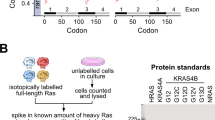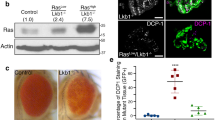Abstract
Ras oncogenes (Hras, Kras and Nras) are important drivers of carcinogenesis. However, tumors with Ras mutations often show loss of the corresponding wild-type (WT) allele, suggesting that proto-oncogenic forms of Ras can function as a suppressor of carcinogenesis. In vitro studies also suggest that WT Ras proteins can suppress the tumorigenic properties of alternate mutant Ras family members, but in vivo evidence for these heterologous interactions is lacking. We have investigated the genetic interactions between different combinations of mutant and WT Ras alleles in vivo using carcinogen-induced lung and skin carcinogenesis in mice with targeted deletion of different Ras family members. The major suppressor effect of WT Kras is observed only in mutant Kras-driven lung carcinogenesis, where loss of one Kras allele led to increased tumor number and size. Deletion of one Hras allele dramatically reduced the number of skin papillomas with Hras mutations, consistent with Hras as the major target of mutation in these tumors. However, skin carcinoma numbers were very similar, suggesting that WT Hras functions as a suppressor of progression from papillomas to invasive squamous carcinomas. In the skin, the Kras proto-oncogene functions cooperatively with mutant Hras to promote papilloma development, although the effect is relatively small. In contrast, the Hras proto-oncogene attenuated the activity of mutant Kras in lung carcinogenesis. Interestingly, loss of Nras increased the number of mutant Kras-induced lung tumors, but decreased the number of mutant Hras-induced skin papillomas. These results show that the strongest suppressor effects of WT Ras are only seen in the context of mutation of the cognate Ras protein, and only relatively weak effects are detected on tumor development induced by mutations in alternative family members. The data also underscore the complex and context-dependent nature of interactions between proto-oncogenic and oncogenic forms of different Ras family members during tumor development.
This is a preview of subscription content, access via your institution
Access options
Subscribe to this journal
Receive 50 print issues and online access
$259.00 per year
only $5.18 per issue
Buy this article
- Purchase on Springer Link
- Instant access to full article PDF
Prices may be subject to local taxes which are calculated during checkout




Similar content being viewed by others
References
Bos JL . ras oncogenes in human cancer: a review. Cancer Res 1989; 49: 4682–4689.
Balmain A, Pragnell IB . Mouse skin carcinomas induced in vivo by chemical carcinogens have a transforming Harvey-ras oncogene. Nature 1983; 303: 72–74.
You M, Candrian U, Maronpot RR, Stoner GD, Anderson MW . Activation of the Ki-ras protooncogene in spontaneously occurring and chemically induced lung tumors of the strain A mouse. Proc Natl Acad Sci USA 1989; 86: 3070–3074.
To MD, Wong CE, Karnezis AN, Del Rosario R, Di Lauro R, Balmain A . Kras regulatory elements and exon 4A determine mutation specificity in lung cancer. Nat Genet 2008; 40: 1240–1244.
Manenti G, Trincucci G, Pettinicchio A, Amendola E, Scarfo M, Dragani TA . Cis-acting genomic elements of the Pas1 locus control Kras mutability in lung tumors. Oncogene 2008; 27: 5753–5758.
Bremner R, Balmain A . Genetic changes in skin tumor progression: correlation between presence of a mutant ras gene and loss of heterozygosity on mouse chromosome 7. Cell 1990; 61: 407–417.
Buchmann A, Ruggeri B, Klein-Szanto AJ, Balmain A . Progression of squamous carcinoma cells to spindle carcinomas of mouse skin is associated with an imbalance of H-ras alleles on chromosome 7. Cancer Res 1991; 51: 4097–4101.
Modrek B, Ge L, Pandita A, Lin E, Mohan S, Yue P et al. Oncogenic activating mutations are associated with local copy gain. Mol Cancer Res 2009; 7: 1244–1252.
Sweet-Cordero A, Tseng GC, You H, Douglass M, Huey B, Albertson D et al. Comparison of gene expression and DNA copy number changes in a murine model of lung cancer. Genes Chromosomes Cancer 2006; 45: 338–348.
To MD, Quigley DA, Mao JH, Del Rosario R, Hsu J, Hodgson G et al. Progressive genomic instability in the FVB/Kras(LA2) mouse model of lung cancer. Mol Cancer Res 2011; 9: 1339–1345.
Zhang Z, Wang Y, Vikis HG, Johnson L, Liu G, Li J et al. Wildtype Kras2 can inhibit lung carcinogenesis in mice. Nat Genet 2001; 29: 25–33.
To MD, Perez-Losada J, Mao JH, Hsu J, Jacks T, Balmain A . A functional switch from lung cancer resistance to susceptibility at the Pas1 locus in Kras2LA2 mice. Nat Genet 2006; 38: 926–930.
Diaz R, Lue J, Mathews J, Yoon A, Ahn D, Garcia-Espana A et al. Inhibition of Ras oncogenic activity by Ras protooncogenes. Int J Cancer 2005; 113: 241–248.
Johnson L, Greenbaum D, Cichowski K, Mercer K, Murphy E, Schmitt E et al. K-ras is an essential gene in the mouse with partial functional overlap with N-ras. Genes Dev 1997; 11: 2468–2481.
Jackson EL, Willis N, Mercer K, Bronson RT, Crowley D, Montoya R et al. Analysis of lung tumor initiation and progression using conditional expression of oncogenic K-ras. Genes Dev 2001; 15: 3243–3248.
Tuveson DA, Shaw AT, Willis NA, Silver DP, Jackson EL, Chang S et al. Endogenous oncogenic K-ras(G12D) stimulates proliferation and widespread neoplastic and developmental defects. Cancer Cell 2004; 5: 375–387.
Ise K, Nakamura K, Nakao K, Shimizu S, Harada H, Ichise T et al. Targeted deletion of the H-ras gene decreases tumor formation in mouse skin carcinogenesis. Oncogene 2000; 19: 2951–2956.
Nagase H, Bryson S, Cordell H, Kemp CJ, Fee F, Balmain A . Distinct genetic loci control development of benign and malignant skin tumours in mice. Nat Genet 1995; 10: 424–429.
Hager JH, Hodgson JG, Fridlyand J, Hariono S, Gray JW, Hanahan D . Oncogene expression and genetic background influence the frequency of DNA copy number abnormalities in mouse pancreatic islet cell carcinomas. Cancer Res 2004; 64: 2406–2410.
Dworkin AM, Ridd K, Bautista D, Allain DC, Iwenofu OH, Roy R et al. Germline variation controls the architecture of somatic alterations in tumors. PLoS Genet 2010; 6: e1001136.
Hennings H, Glick AB, Lowry DT, Krsmanovic LS, Sly LM, Yuspa SH . FVB/N mice: an inbred strain sensitive to the chemical induction of squamous cell carcinomas in the skin. Carcinogenesis 1993; 14: 2353–2358.
Perez-Losada J, Balmain A . Stem-cell hierarchy in skin cancer. Nat Rev Cancer 2003; 3: 434–443.
Cui W, Fowlis DJ, Bryson S, Duffie E, Ireland H, Balmain A et al. TGFbeta1 inhibits the formation of benign skin tumors, but enhances progression to invasive spindle carcinomas in transgenic mice. Cell 1996; 86: 531–542.
Diaz R, Ahn D, Lopez-Barcons L, Malumbres M, Perez de Castro I, Lue J et al. The N-ras proto-oncogene can suppress the malignant phenotype in the presence or absence of its oncogene. Cancer Res 2002; 62: 4514–4518.
Quinlan MP, Settleman J . Explaining the preponderance of Kras mutations in human cancer: an isoform-specific function in stem cell expansion. Cell Cycle 2008; 7: 1332–1335.
Johnson L, Mercer K, Greenbaum D, Bronson RT, Crowley D, Tuveson DA et al. Somatic activation of the K-ras oncogene causes early onset lung cancer in mice. Nature 2001; 410: 1111–1116.
Lee KE, Bar-Sagi D . Oncogenic KRas suppresses inflammation-associated senescence of pancreatic ductal cells. Cancer Cell 2010; 18: 448–458.
Mao JH, To MD, Perez-Losada J, Wu D, Del Rosario R, Balmain A . Mutually exclusive mutations of the Pten and ras pathways in skin tumor progression. Genes Dev 2004; 18: 1800–1805.
Nagase H, Mao JH, Balmain A . Allele-specific Hras mutations and genetic alterations at tumor susceptibility loci in skin carcinomas from interspecific hybrid mice. Cancer Res 2003; 63: 4849–4853.
Acknowledgements
We are grateful to Dr Motoya Katsuki and Dr Hiroki Nagase for the HrasKO mice, and Dr Tyler Jacks for the LSL-KrasG12D mice. This work was supported by NCI Grants CA111834-01 and CA84244 to AB. PMKW is supported by NIH Training Grant T32 GM007175 and a National Science Foundation Graduate Research Fellowship. MDT acknowledges the support from the Nan Tucker McEvoy Research Fund in Thoracic Oncology. AB acknowledges support from the Barbara Bass Bakar Chair in Cancer Genetics.
Author information
Authors and Affiliations
Corresponding authors
Ethics declarations
Competing interests
The authors declare no conflict of interest.
Additional information
Supplementary Information accompanies the paper on the Oncogene website
Rights and permissions
About this article
Cite this article
To, M., Rosario, R., Westcott, P. et al. Interactions between wild-type and mutant Ras genes in lung and skin carcinogenesis. Oncogene 32, 4028–4033 (2013). https://doi.org/10.1038/onc.2012.404
Received:
Revised:
Accepted:
Published:
Issue Date:
DOI: https://doi.org/10.1038/onc.2012.404
Keywords
This article is cited by
-
KRAS allelic imbalance drives tumour initiation yet suppresses metastasis in colorectal cancer in vivo
Nature Communications (2024)
-
Multiplexed screens identify RAS paralogues HRAS and NRAS as suppressors of KRAS-driven lung cancer growth
Nature Cell Biology (2023)
-
The phospholipid transporter PITPNC1 links KRAS to MYC to prevent autophagy in lung and pancreatic cancer
Molecular Cancer (2023)
-
Enhanced BRAF engagement by NRAS mutants capable of promoting melanoma initiation
Nature Communications (2022)
-
Loss of the wild-type KRAS allele promotes pancreatic cancer progression through functional activation of YAP1
Oncogene (2021)



